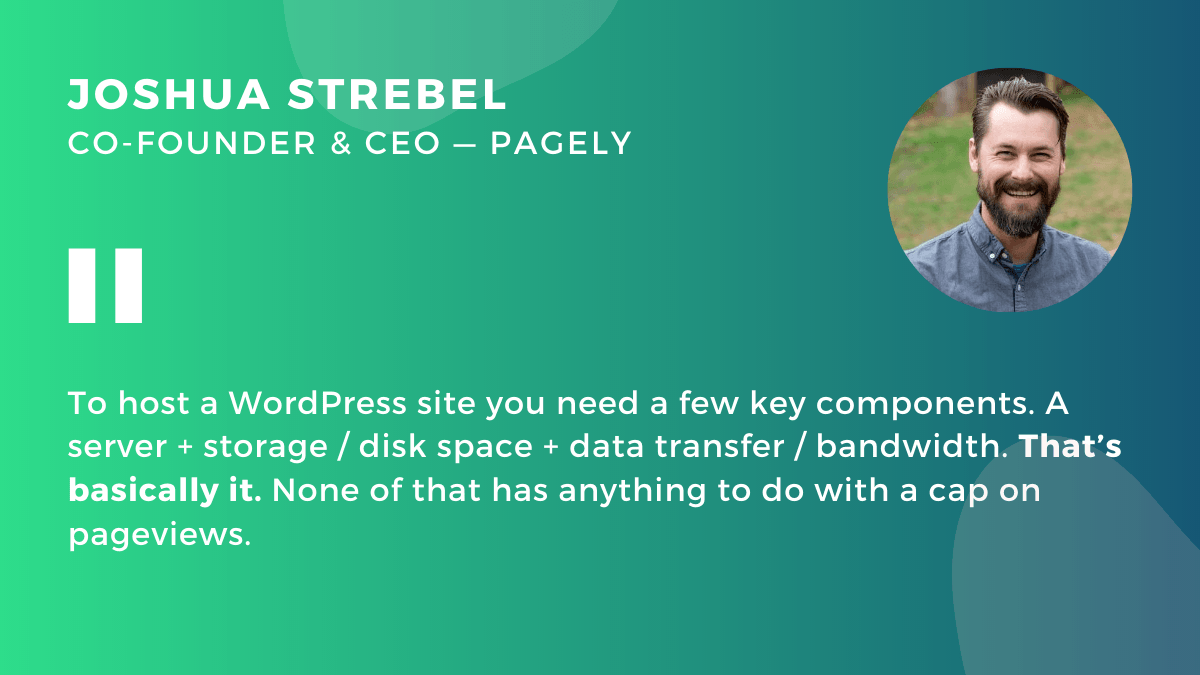Since this is the internet – and the rules of the internet clearly state everyone gets an opinion, I’d like to share one of mine around website hosting billing plans.
Quick backstory: 10+ years ago when we launched Pagely we did so with a simple line on our pricing page denoting a rough estimate of the expected capabilities of that plan ie: Plan – 1 was suitable for ~1 million pageviews. Along came the next several providers who did something similar with one important difference. They actually attempted to measure and cap pageviews per hosting plan, bracketing their plans by this new billing metric.
In my opinion Pageviews used as a billing item is a predatory and anti-consumer practice and you should be very wary of working with any company that applies this #successtax to your monthly bill.
Definition of anti-consumer
: not favorable to consumers: improperly favoring the interests of businesses over the interests of consumers
Hi, I’m Joshua Strebel, Co-founder and CEO of Pagely – A leading Managed WordPress hosting company – Thank you for attending my TED Talk.
What are you buying when you are buying “hosting”?
To host a WordPress site you need a few key components.
- A server (a computer) connected to the internet with software installed to process requests and responses for your application.
- Storage / Disk space attached to that webserver to save your files to.
- Data Transfer / Bandwidth. This is the pipe the information flows through.
That’s basically it. Hosting providers typically lease/sell you packaged fragments of these resources for a monthly fee. Plan A, Plan B, Plan C. etc. Of course there are other items that may be line-itemed such as included support levels, CDN GB’s per month, managed services, etc.

Plan A has X amount of consumables for Z price. It’s all fairly straightforward as most consumers understand what a Gigabyte of Disk space is and can at least grasp that more CPU/RAM offered should equate to more potential performance.
“Pageviews” does not fit this model well – as the definition of a pageview is amorphous and subject to exploitation. Oh, and spoiler alert, PHP workers is not a valid billing metric for WordPress hosts either.
What does an automobile lease have to do with hosting plans?
Pageview limits on hosting plans are akin to annual mileage limits on auto leases. It’s a cap on the use of an asset you already purchased. In an automobile lease context a mileage cap at least has some merit as being a form of controlling the depreciation of the vehicle – you are essentially financing the deprecation of the automobile asset with a lease – and the lease company expects to sell that car (New retail value – Depreciation) when you return it. If the depreciation is too high, they lose money on that transaction as they have to sell it for less than they calculated.
Your hosting plan is not a depreciating asset though – the hosting company is going to sell the same resources to the next customer when you are done for the same or likely higher fee.
Therefore in my humble opinion: Pageviews are just an arbitrary anti-consumer fee – a penalty tax for using the service you already paid for.
A Pageview is (depending on who you ask) a wrapper around these items:
- A measurable amount of Data Transfer in and out
- A measurable amount of CPU resources to process the request and render the response
- A measurable amount of Disk and Database activity
Are you not already paying for these items as part of your hosting plan? Hint: Yes you are.
But wait, there’s more – and my colleague will dig into these more in a future post.
- This pageview billing model is so poorly defined by the hosts that use it – it is ripe for abuse.
- It’s a scheme to generate revenue for the hosting company and unfairly penalizes the consumer. Hint: You already “paid” for the sum of the parts of a “pageview”.
- No two pages are the same. A cached page even with a few images can be served a million times a month with ease, and yet a badly coded membership-site page may tax the hardware it runs on each time it loads. They have very different cost profiles to the host – yet both are treated equally under this model.
- If you invested the time to optimize your site, get it caching well and then blow it up with viral traffic.. That is a GOOD day for you and costs your host pennies of the monthly fee you are already paying them – yet when you get the overage bill for exceeding your pageview cap at the end of the month, are you going to enjoy that tax on your success?
If you want to keep paying twice for the same resources you are welcome to. I simply do not think that is fair.
Our friends down in Austin have made millions on charging their customers overage fees for exceeding their monthly pageview cap – even to the point having to publicly respond to criticism – only to keep the practice in place.
Reminds me of airline baggage fees and fuel surcharges.
and
An “online payment convenience fee” when they only accept payments online.
and
JetPack being “free”.
Happy WordPress’ing
– Joshua Strebel
ive always hated how every single wordpress host measures its plans by page views, 10,000 views, etc i would rather bandwidth number be specified, thats how it always has been, and was on other hosts via a vps or dedicated server